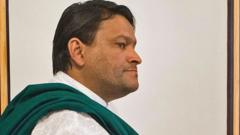A recent survey has surfaced enlightening revelations about the spiritual beliefs within different age groups in the UK, pinpointing Gen Z as the most spiritually engaged demographic. Conducted by OnePoll and commissioned by Christopher Gasson for his latest book on religion, the survey sheds light on a noteworthy transition in faith and spirituality across generations.
Shifting Beliefs: Gen Z Leads Spiritual Resurgence in the UK

Shifting Beliefs: Gen Z Leads Spiritual Resurgence in the UK
A new survey reveals that Gen Z is reshaping spirituality across the UK, highlighting their distinct beliefs compared to older generations.
The results indicate that younger individuals aged 18-24, categorized under Gen Z, are fostering a revival in spiritual practices. Only 13% of respondents from this age bracket identified as atheists, making them the least inclined to dismiss spirituality entirely. Moreover, an impressive 62% of Gen Z members consider themselves either “very” or “fairly” spiritual. This contrasts sharply with their older counterparts, who display higher rates of disbelief.
Among those in the Gen X demographic (ages 45-60), a notable 25% claim to have no spiritual beliefs, labeling them as the most atheistic age group. Baby Boomers over 65 and Millennials aged 25-44 reflect a similar skepticism, with both groups reporting atheism rates at 20%, suggesting a more secular viewpoint overall.
The survey not only presents statistics but also delves into the factors contributing to the decline of traditional Christianity, particularly among younger individuals. Key reasons cited by Gen Z include the failure of religious institutions to address scandals, including abuse, and a preference for personal spiritual exploration over formal Christianity.
Despite the waning influence of Christianity, the growing spiritual self-identification among Gen Z indicates an evolution in how faith is perceived. Christopher Gasson’s research underscores this transformation, pointing to a gradual redefinition of belief systems alongside shifting generational values.
These findings imply that younger generations are not completely abandoning faith; instead, they are redefining spirituality to fit their personal contexts. Gen Z’s willingness to navigate their belief systems emphasizes a larger trend towards individualism in matters of faith.
The landscape of spirituality in the UK is clearly changing, with younger generations moving away from conventional structures while forging new connections with the divine. This trend suggests that the intrinsic human need for spiritual engagement remains robust, regardless of the challenges faced by organized religion.
Among those in the Gen X demographic (ages 45-60), a notable 25% claim to have no spiritual beliefs, labeling them as the most atheistic age group. Baby Boomers over 65 and Millennials aged 25-44 reflect a similar skepticism, with both groups reporting atheism rates at 20%, suggesting a more secular viewpoint overall.
The survey not only presents statistics but also delves into the factors contributing to the decline of traditional Christianity, particularly among younger individuals. Key reasons cited by Gen Z include the failure of religious institutions to address scandals, including abuse, and a preference for personal spiritual exploration over formal Christianity.
Despite the waning influence of Christianity, the growing spiritual self-identification among Gen Z indicates an evolution in how faith is perceived. Christopher Gasson’s research underscores this transformation, pointing to a gradual redefinition of belief systems alongside shifting generational values.
These findings imply that younger generations are not completely abandoning faith; instead, they are redefining spirituality to fit their personal contexts. Gen Z’s willingness to navigate their belief systems emphasizes a larger trend towards individualism in matters of faith.
The landscape of spirituality in the UK is clearly changing, with younger generations moving away from conventional structures while forging new connections with the divine. This trend suggests that the intrinsic human need for spiritual engagement remains robust, regardless of the challenges faced by organized religion.























